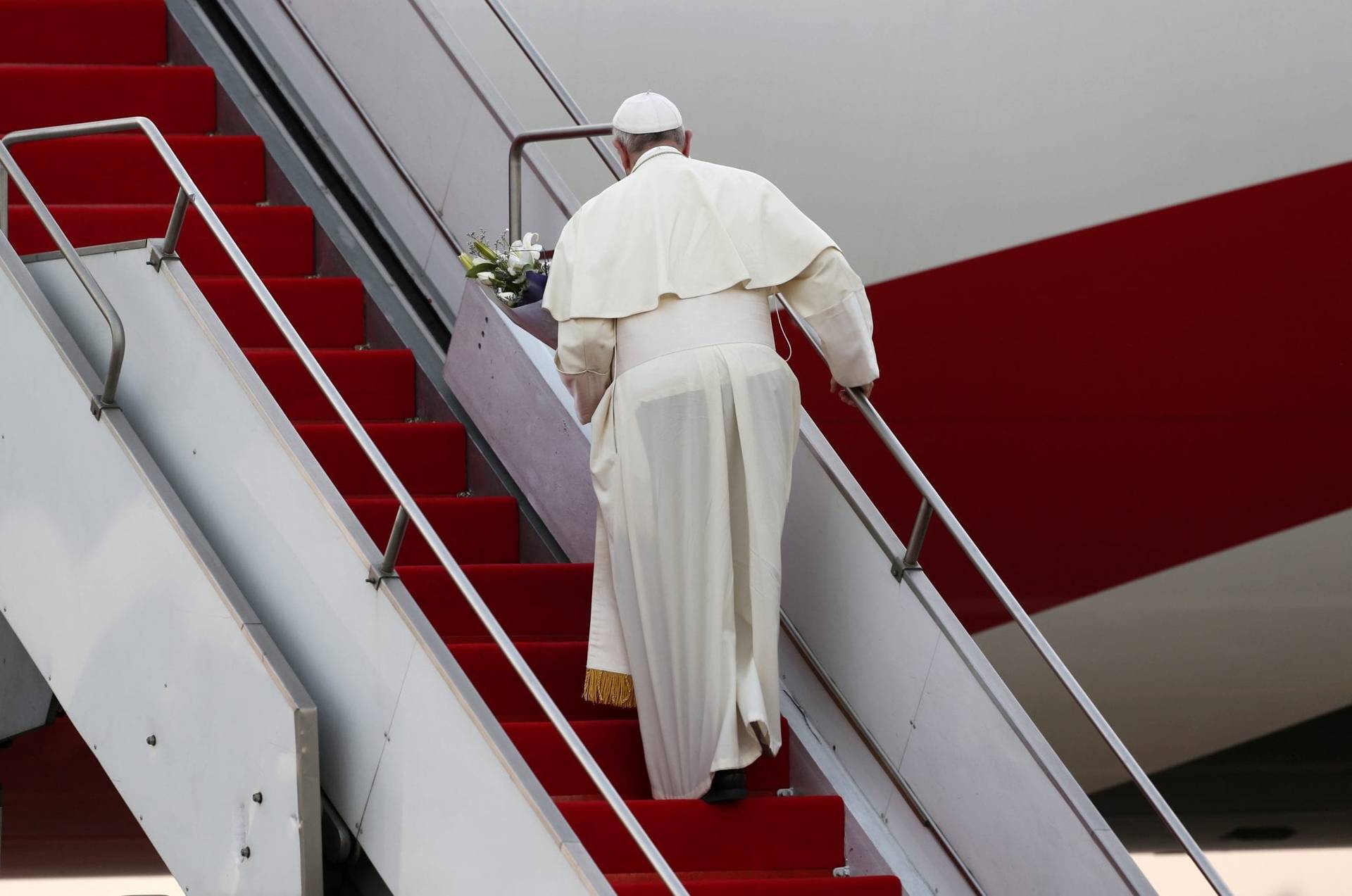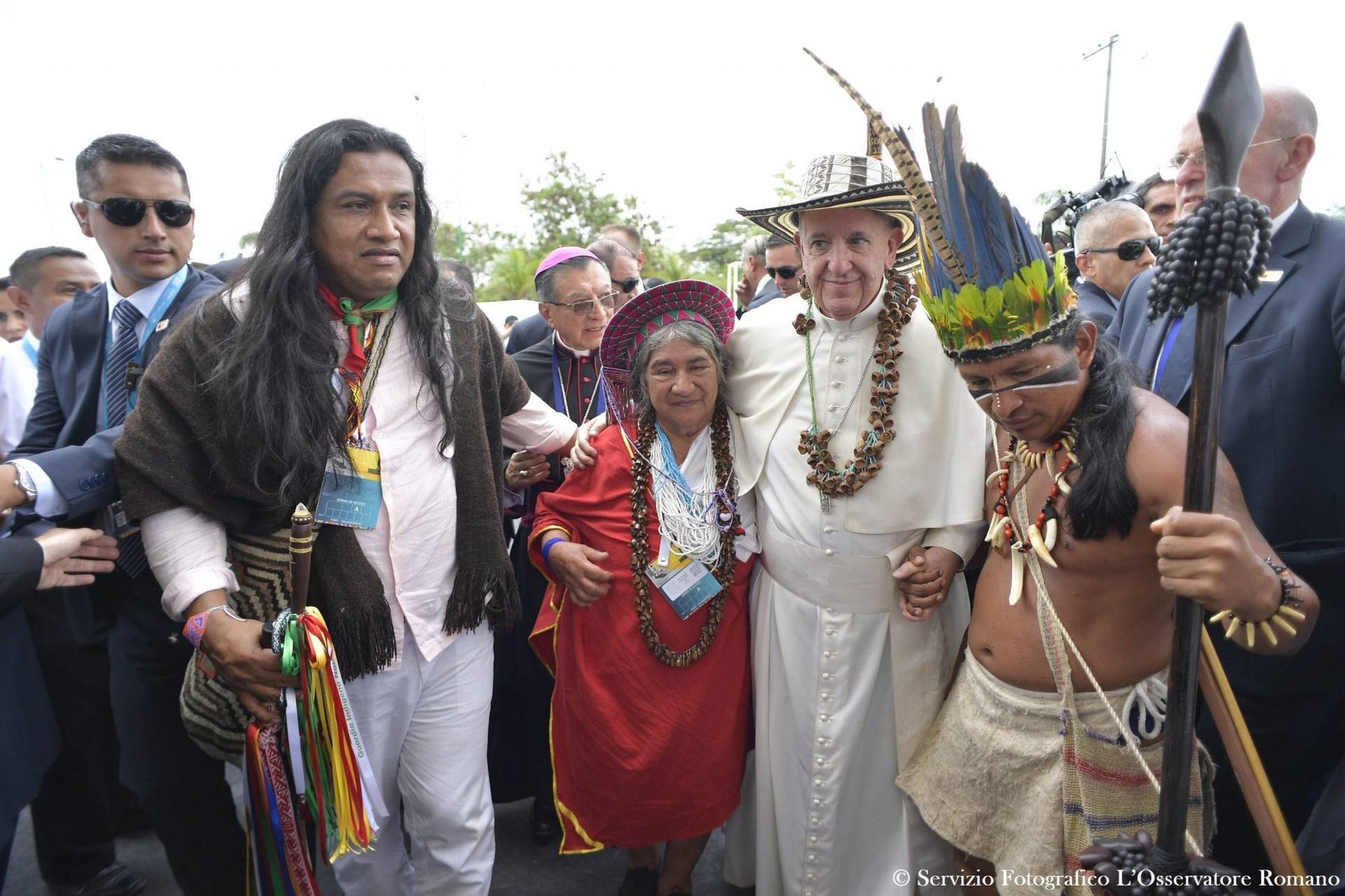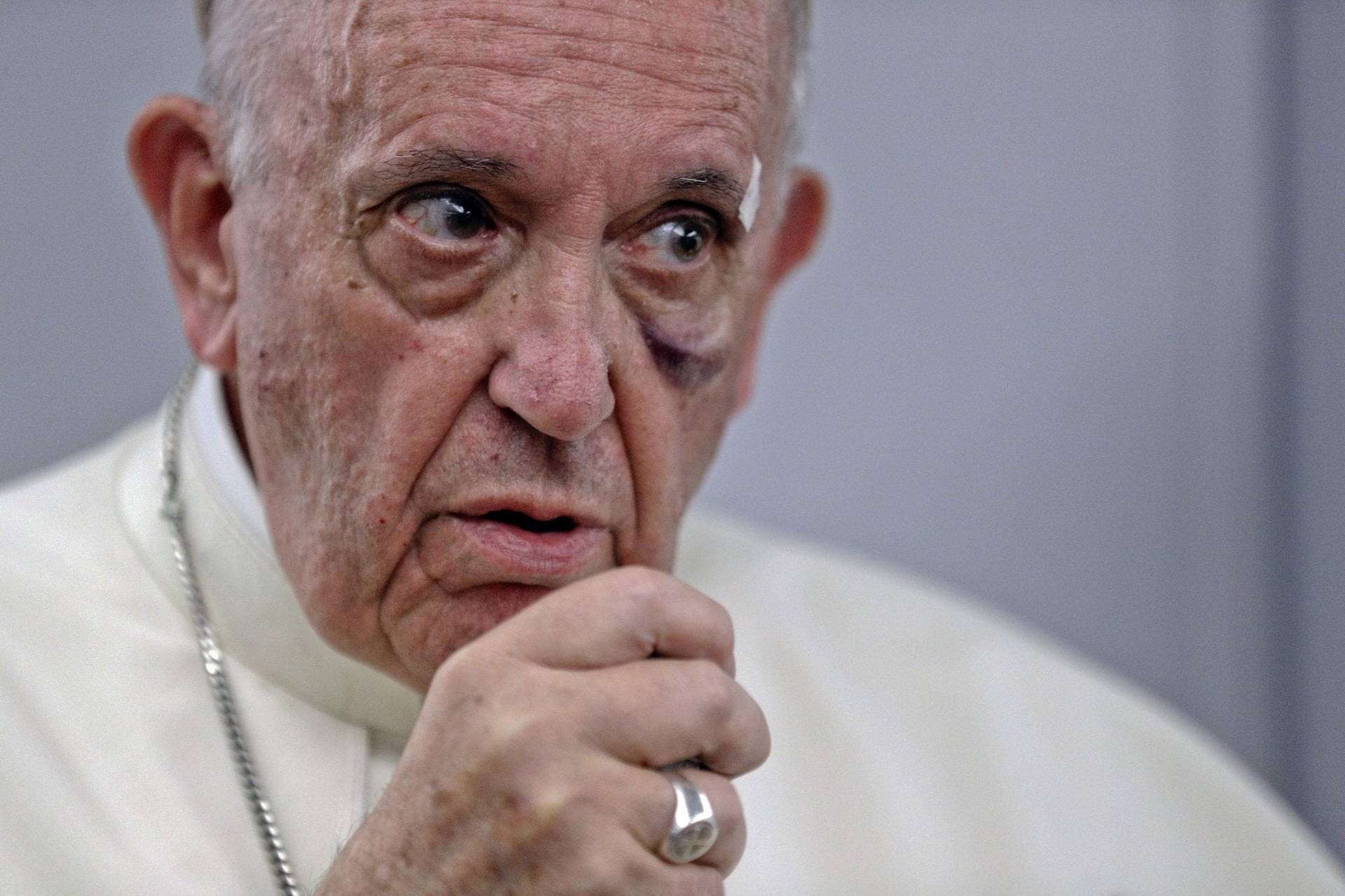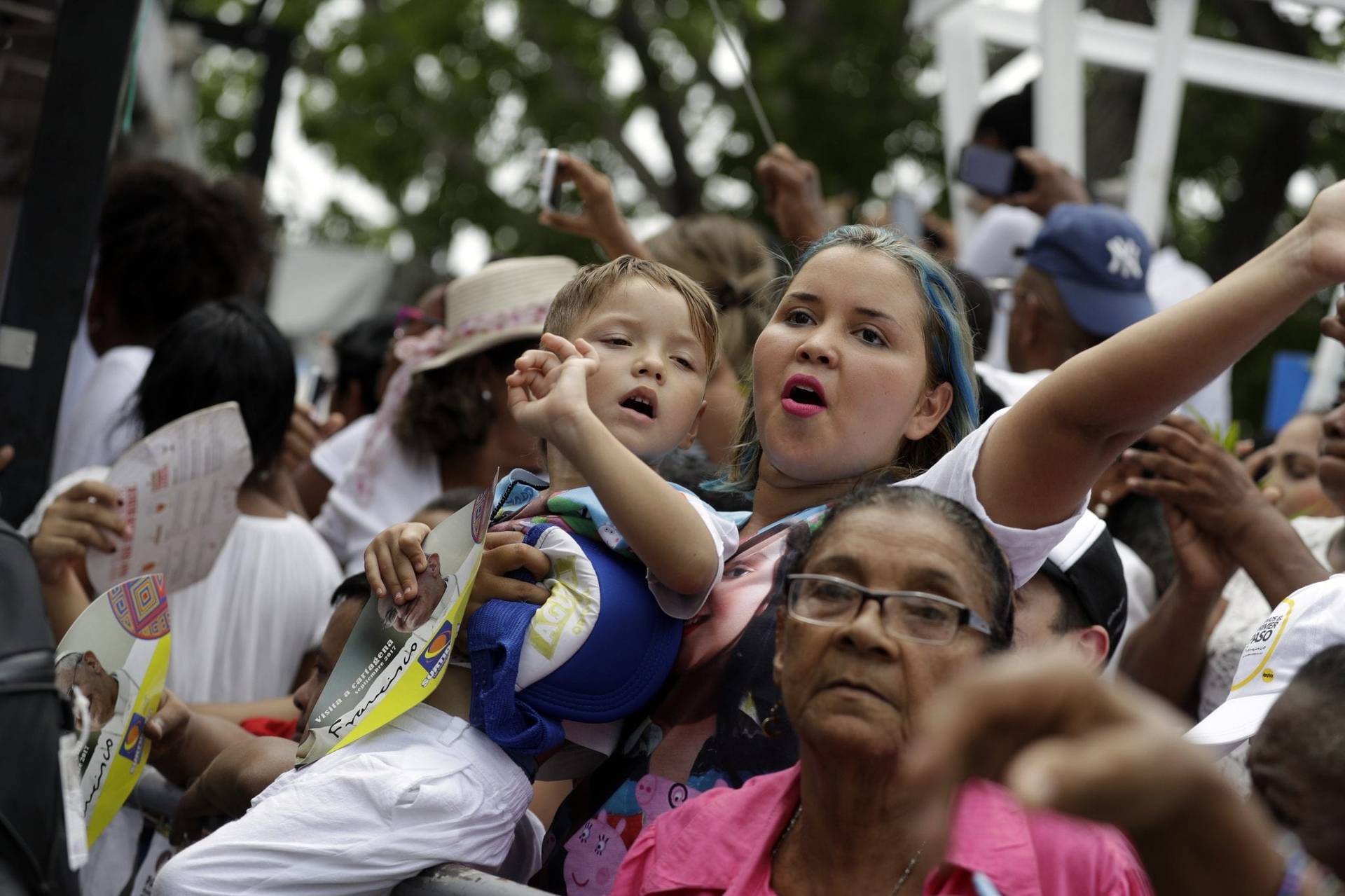VILAVICENCIO, Colombia – Pope Francis has a packed schedule for his Sept. 6-11 visit to Colombia, but Friday brought the one event he was looking forward to above all: A prayer service for national reconciliation with some 6,000 people, some victims of the country’s long-running civil war, and some, including former guerillas and military members, perpetrators of that violence.
“I have been looking forward to this moment since my arrival in your country,” he said, opening his remarks on Friday afternoon, at the Las Malocas Park.
During the Great Prayer Meeting for National Reconciliation, the pope urged Colombians to place their suffering at the feet of Jesus Crucified, “so that united to his suffering, it may be transformed into blessing and forgiveness so as to break the cycle of violence that has reigned over Colombia.”
Referencing words shared with the pope by a Colombian named Pastora Mira García, a victim of the violence, Francis said: “Violence leads to more violence, hatred to more hatred, death to more death. We must break this cycle!”
With Christ’s help, the pope said, it’s possible to conquer hatred and death, and to begin building a new Colombia.
García had a first-hand experience of the violence in the country, both by the guerrilla and the paramilitary groups: Her dad was murdered when she was six, her first husband was murdered when their daughter was two months old. She worked for the police, but had to quit due to threats she was receiving. Her daughter was “disappeared” by the paramilitary, and she only found her body seven years later.
Yet she was able to survive both the murder of her father and that of her daughter.
“May God transform the heart of those who refuse to believe that with Christ everything can change, and who don’t have hope in a country at peace and more united,” she said.
The motto of Pope Francis’s trip is “Let us take the first step,” meaning towards reconciliation. Less than 48 hours in, a few scattered small signs of hope actually have arisen.
For instance, notorious guerilla leader Rodrigo Londoño, commander of the Revolutionary Armed Forces of Colombia (FARC), sent a letter to the pontiff on Thursday: “Your repeated messages about God’s infinite mercy move me to plead for your forgiveness for any tears or pain that we have caused to the people of Colombia.”
As a footnote, many Colombians didn’t believe the apology to be sincere, since if it were, they claim, the man formerly known by the alias “Timochenko” would actually pay for the crimes he perpetrated by going to jail.
A less contested fact: one local newspaper, speaking about a “Francis effect” from the trip, reported that, according to Bogotá’s mayor, there were no murders yesterday in a city that sees an average of three violent deaths each day.
Francis has come to Colombia, the pontiff himself said, with the awareness that “I am standing on sacred ground.”
It’s a land, he said, that has been watered by the blood of thousands of “innocent victims and by the heart-breaking sorrow of their families and friends.”
Also giving their testimony were former guerrilla member Juan Carlos Murcia Perdomo and paramilitary member Deisy Sánchez Rey.
Sánchez Rey was recruited by a paramilitary group when she was 16, spent many years in its ranks of her own will, and who reflected on the topic of “justice.” She was in prison for two years. As part of her healing process, she realized she was a victim herself, and that she too deserved a second chance, while acknowledging that she had to give back to society after the hurt she had caused.
Today, she’s a sociologist, and works with other victims of violence.
“I ask the Lord, and you, Holy Father, to pray for the criminals, so that they dignify themselves and the victims, showing their faces, and becoming available to pay their debts through justice,” she said.
Speaking to these two former members of violent groups, the pope thanked them for helping the rest of those present to understand that, in one way or the other, they too are victims. Innocent or guilty, “but all victims.”
“We are all united in this loss of humanity that means violence and death,” the pope said. “Deisy has said it clearly: you realized that you yourself were a victim and you needed to be given a chance.”
Francis then added that there’s hope for those who did wrong, but justice also requires that perpetrators of wrongdoing “undergo moral and spiritual renewal.”
Though he didn’t speak about perpetrators going to jail, he did say that they’re called to make a positive contribution to healing a society that has been wounded by violence.
Murcia reflected on the word “truth,” recounting that he willingly became a member of FARC when he was 16. As time progressed, he realized that despite being taught that weapons and money are the only gods, he never lost his faith completely, and “God made me realize that violence is no truth, and that I had to leave the deepest jungle, that of my heart enslaved by evil, if I wanted to be happy.”
For the long, difficult, yet hopeful process of reconciliation to be successful, the pope said talking about Murcia’s testimony, it’s “indispensable” to come to terms with the truth.
“Truth is an inseparable companion of justice and mercy,” Francis said. “Together they are essential to building peace; each, moreover, prevents the other from being altered and transformed into instruments of revenge against the weakest. Indeed, truth should not lead to revenge, but rather to reconciliation and forgiveness.”
Families torn apart by pain, the pope said, deserve to know what happened to their missing relatives. Some 220,000 people were killed during the five-decades long civil war, and some 60,000 are unaccounted for.
Truth, the pope said, indirectly referring to the guerrilla groups and the paramilitaries, also means confessing what happened to the children who were recruited and recognizing the pain of women who are victims of violence and abuse.
Jesus Mario Corrales, a victim of both the FARC and paramilitary groups, spoke with journalists on Friday. “The first step is for me to accept being next to a perpetrator, and I have,” he said.
He coordinates a group working with victims, and they accept former members of violent organizations.
“We don’t want to continue in this war of ideologies, without understanding why people go to war,” he said, adding that what he wants is to know the truth of what happen to each of the victims, even if that means they were burned in acid or cremated.
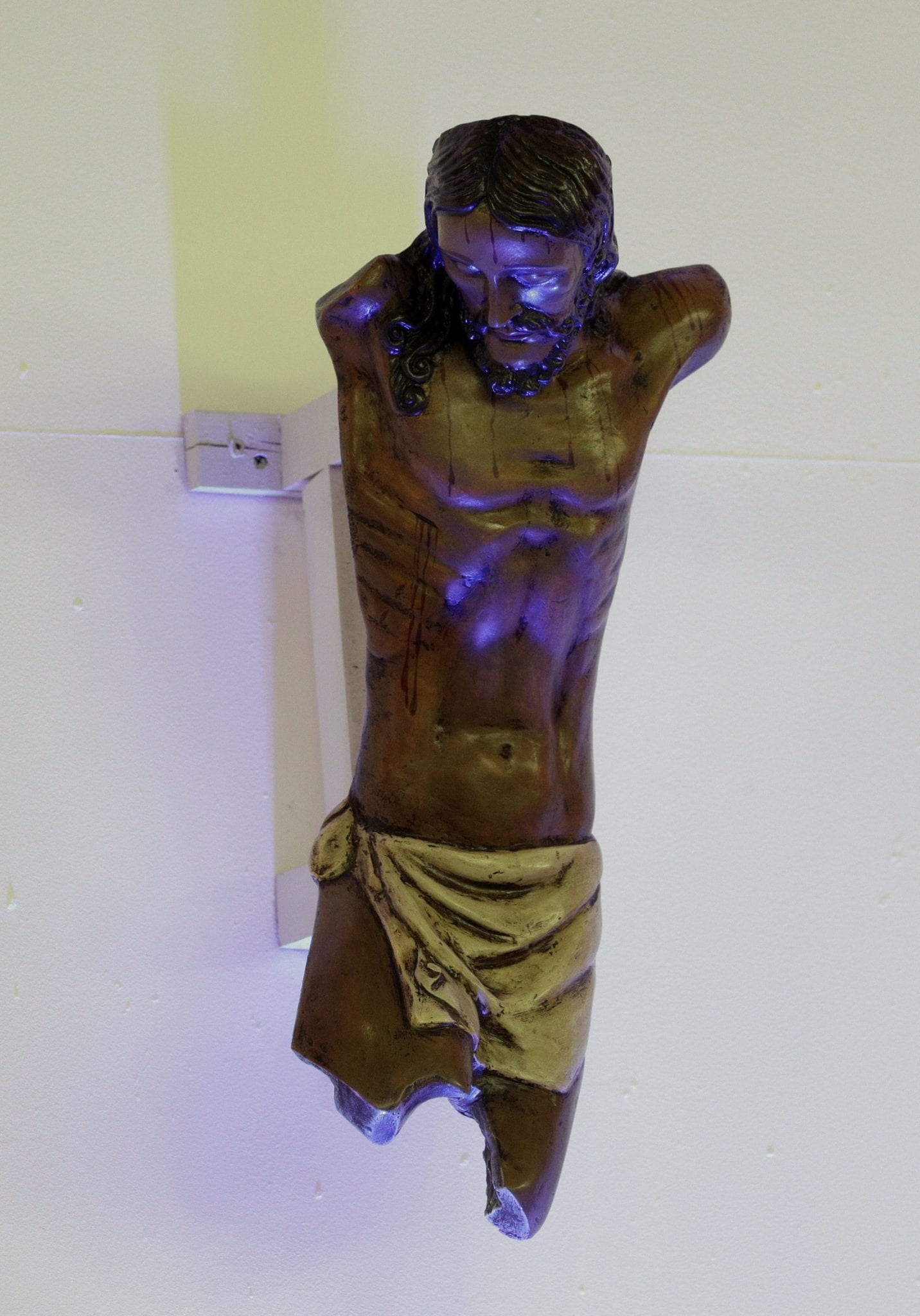
“It is part of the truth, it hurts a lot but it is necessary,” Corrales said. “Without truth the victims will continue to have open wounds, growing deeper. For there to be reconciliation and forgiveness, there must be truth, however hard it may be. Continue with the wounds open and deeper. For reconciliation and forgiveness there must be truth, however hard it may be.”
Also present at the event was the Cristo de Bojayá, known in Colombia as the mutilated Christ or the Black Christ of Bojayá. The image, missing its limbs and much of the body, is what’s left of a crucifix that was in a Church in Bojayá that was bombed in 2002.
RELATED: Christ statue mutilated by war to receive papal blessing
Some 300 Afro-Colombian residents were sheltering in the church – the town’s only concrete building – when it was hit by a mortar launched by the Revolutionary Armed Forces of Colombia during a three-way firefight in 2002 with right-wing militias and the army. At least 79 people died, 40 of them children and 100 were injured.
“Christ broken and without limbs is for us ‘even more Christ’, because he shows us once more that he came to suffer for his people and with his people,” Francis said. “He came to show us that hatred does not have the last word, that love is stronger than death and violence.”
Leiner Palacios, another victim who spoke with journalists, lost 32 members of his family between cousins and nephews.
The Christ of Bojayá is a symbol of the tragedy Colombia has lived: “It’s evidence of how Colombia had its hands, its legs amputated.
“But the Holy Father has chosen to come precisely to look for those arms and those legs, to build reconciliation and peace. The invitation of the pope is for forgiveness, and we have the need to do so. It’s not easy, but it’s needed. We need to be conscious of the fact that if we, the victims, do unto others what was done to us, the violence will never end.”
During Friday’s event, victims and perpetrators were seated next to each other, the majority of them wearing white clothes, often considered the color of peace.
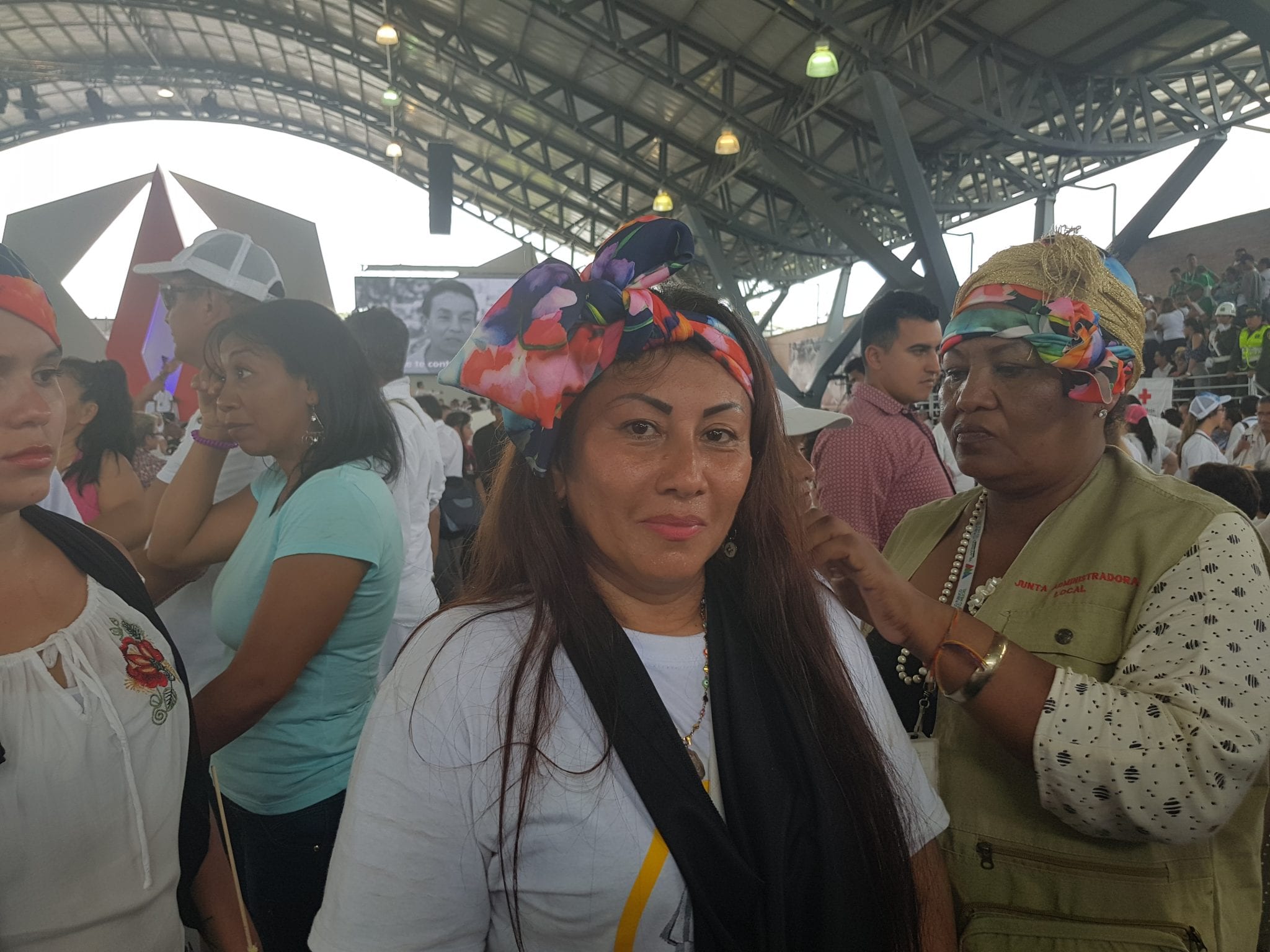
Among those present was a group of some 40 women, victims of sexual violence. One of them was Viviana Verdesoto.
She told reporters that she was sexually abused by paramilitaries 13 years ago. The group kidnapped her husband, and as a condition of releasing him, they raped Verdesoto and their daughter, who was 10 at the time. She broke down in tears when telling her story.
She believes that Francis has the ability to move the country towards a lasting reconciliation. But in her case, the process began much earlier. The men who raped her daughter and her are today in prison, and this sense of justice goes a long way. But above all, she said, forgiving them has settled her heart, given her peace.
“To be able to live in peace, you have to be able to reconcile with the enemy,” Verdesoto said.
Though Pope Francis’s message for reconciliation was addressed mainly at Colombia, through his Twitter account he made it evident that it didn’t apply solely to this nation. Sharing it in his multiple accounts, that collect over 36 million people, he said:
Reconciliation is consolidated by the contribution of all. It enables us to build the future and makes hope grow.
— Pope Francis (@Pontifex) September 8, 2017










